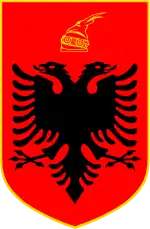| ||||||||||||||||||||||||||||||||||||
All 140 seats in People's Assembly 71 seats needed for a majority | ||||||||||||||||||||||||||||||||||||
This lists parties that won seats. See the complete results below.
| ||||||||||||||||||||||||||||||||||||
 |
|---|
|
|
Parliamentary elections were held in Albania on 22 March 1992, with a second round of voting for eleven seats on 29 March.[1][2] The result was a victory for the opposition Democratic Party of Albania, which won 92 of the 140 seats. After the elections Aleksandër Meksi became Prime Minister and Sali Berisha became President.
Background
Amid the economic crisis and increasing social destabilization that accompanied Albania's transition from a one-party communist regime led by the Party of Labour to a multi-party representative democracy, the March 1991 parliamentary elections resulted in a political stalemate caused by the split of the Albanian electorate: while the urban population, constituting a minority of the electorate, actively voted for opposition parties (primarily for the newly formed center-right Democratic Party), the rural population, constituting the majority of the electorate, continued to remain loyal to the ruling party, which led to the victory of the communists with an absolute majority.[3]
The opposition did not readily accept the election results and from the outset called for a series of protests and strikes against the elected government, receiving support from independent trade unions who demanded a 50% increase in wages, union control over working conditions and the bringing to justice of those responsible for the Shkodra massacre on 2 April.[4] While the opposition in parliament boycotted votes on projects proposed by the communist government, mass protests and strikes virtually paralyzed the country. Under these conditions, the People's Assembly yielded to the demands of the strikers, deciding to form a new government and hold early elections for a parliament reduced to 140 seats. On 5 June the cabinet of Fatos Nano was replaced by the “national stability Government” led by Yli Bufi also a representative of the reformist wing.[5] New elections were scheduled for March next year. On 10 December Bufi was replaced at the head of the government by the non-partisan Vilson Ahmeti, who was considered the “technical prime minister” for the period before early elections.[6]
Campaign
The ruling Party of Labour, under the leadership of then Prime Minister Fatos Nano, who represented the reformist wing of the party, abandoned communist ideology and changed its name to the Socialist Party of Albania, proclaiming a course towards building democracy and a market economy. The country, in turn, also changed its official name: after eliminating the adjectives Socialist and People's, it officially became the Republic of Albania. Nano's government sought to implement structural reforms that would gradually move the country toward capitalism while allowing ex-communists to retain power.[7]
American officials supported the Democratic Party, with US Ambassador William Rierson appearing at their rallies. In response, the Socialist Party accused the Americans of providing "illegitimate support".[8]
Results
 | |||||
|---|---|---|---|---|---|
| Party | Votes | % | Seats | +/– | |
| Democratic Party of Albania | 1,046,193 | 57.61 | 92 | +17 | |
| Socialist Party of Albania | 433,602 | 23.87 | 38 | –131 | |
| Social Democratic Party of Albania | 73,820 | 4.06 | 7 | New | |
| Republican Party of Albania | 52,477 | 2.89 | 1 | +1 | |
| Unity for Human Rights Party | 48,923 | 2.69 | 2 | –3 | |
| Other parties | 161,127 | 8.87 | 0 | – | |
| Total | 1,816,142 | 100.00 | 140 | –110 | |
| Registered voters/turnout | 2,021,169 | – | |||
| Source: Nohlen & Stöver | |||||
Aftermath
References
- ↑ Dieter Nohlen & Philip Stöver (2010) Elections in Europe: A data handbook, p133 ISBN 978-3-8329-5609-7
- ↑ Albania: Elections held in 1992 Inter-Parliamentary Union
- ↑ "ALBANIA: parliamentary elections Kuvendi Popullor, 1991". Inter-Parliamentary Union. Retrieved 2024-01-11.
- ↑ "Human Rights Watch World Report 1992 - Albania". Human Rights Watch. 1 January 1992. Retrieved 10 January 2024.
- ↑ "ALBANIA Parliamentary Chamber: Kuvendi Popullor". Inter-Parliamentary Union. 1992. Retrieved 10 January 2024.
- ↑ Kamm, Henry (1992-03-12). "No Food or Jobs or Spirit: Albania Prepares to Vote". The New York Times. ISSN 0362-4331. Retrieved 2024-01-11.
- ↑ "Albanian politics since the fall of communism". Reuters. May 9, 2011. Retrieved January 10, 2024.
- ↑ Williams, Carol J. (9 March 1992). "U.S. Gives Albania's Democrats a Helping Hand : Election: Americans, convinced Communist rule will hinder reforms, put their weight behind the opposition". Los Angeles Times.
